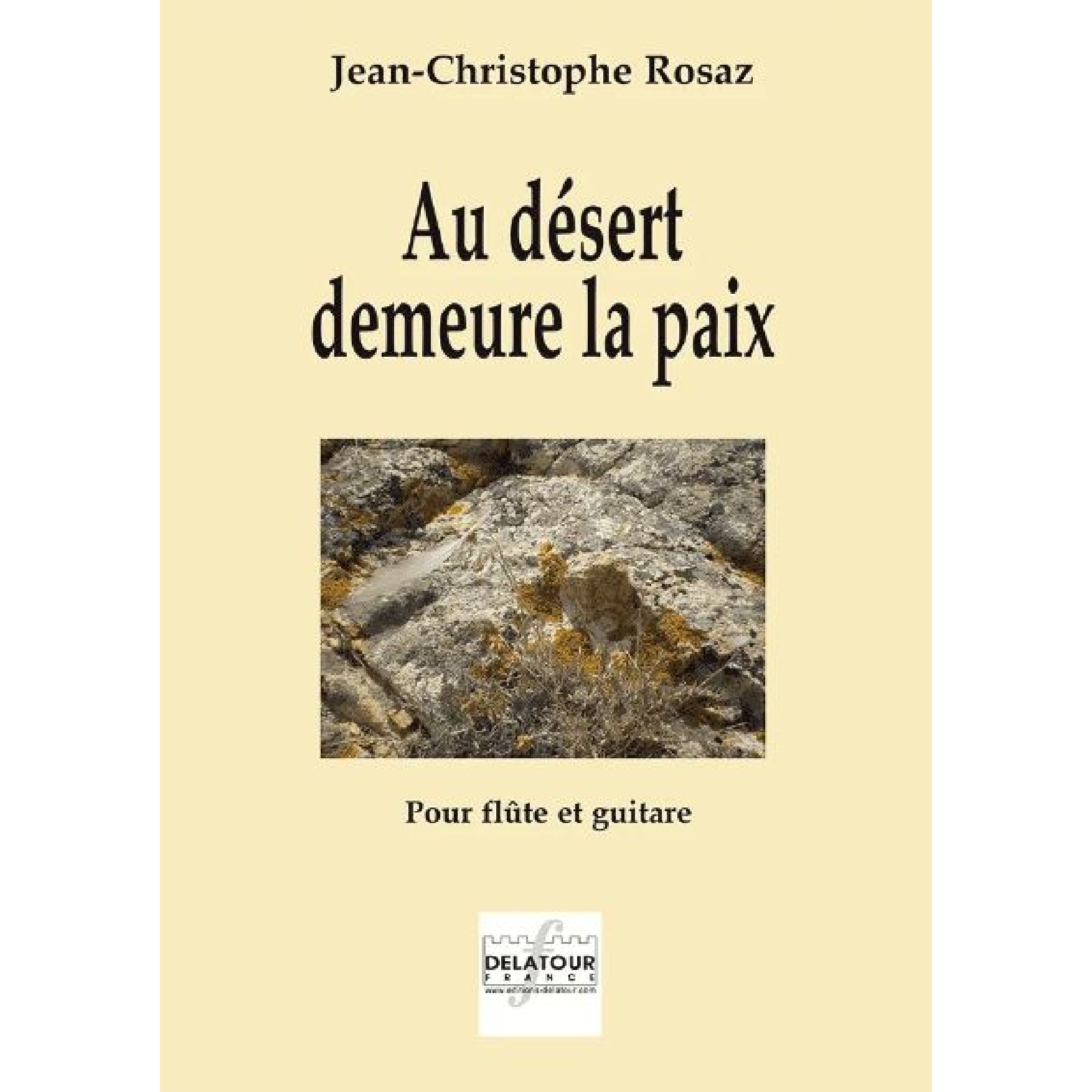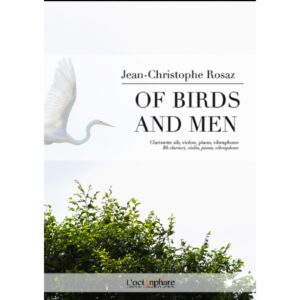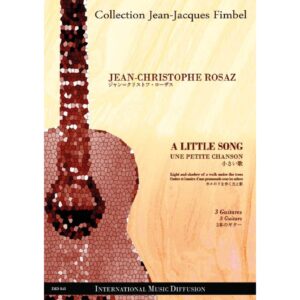Au désert demeure la paix – for flute & guitar (or harp)
Pour flûte et guitare – durée 7’30 environ
versions disponibles: clarinette, saxophone, violoncelle / flûte et harpe
Cette pièce composée en hommage à la musique israélo-arabe du bassin méditerranéen en utilise certaines bribes de phrases et modes ainsi que la façon de faire sonner instruments à cordes pincées ou « soufflées. » Elle se veut aussi, en ces temps « voilés », proposer un autre sujet d’échange entre les deux mondes d’ici et là-bas, occident et proche orient. Une toute autre rencontre qui a le désir d’élever un peu le débat et se nourrir des richesses de chaque culture et vision du monde. Cette partition évoque la dissolution d’une certaine violence, derniers échos des tensions de la journée passée (illustrée par les pizz Bartok à la guitare) vers une danse qui, les emportant, réunit les voix de la flûte et de la guitare jusqu’à s’apaiser dans un chant final.
commander la partition / buy the score
This piece, composed in homage to the Israeli-Arab music of the Mediterranean basin, uses certain fragments of phrases and modes as well as the way of making plucked or « blown » string instruments sound. It also aims, in these « veiled » times, to propose another subject of exchange between the two worlds here and there, the West and the Near East. A completely different encounter that has the desire to elevate the debate a little and feed on the riches of each culture and vision of the world. This score evokes the dissolution of a certain violence, last echoes of the tensions of the past day (illustrated by Bartok’s pizz on the guitar) towards a dance which, carrying them away, unites the voices of the flute and the guitar until calming down in a final song.
Description
version for flute & harp:
A travers cette partition, Jean-Christophe Rosaz donne à la flûte et son inséparable guitare l’occasion de « croiser les fers » mais aussi de créer un espace de liberté où trouver la paix. Dans un langage inscrit dans le courant des musiques d’aujourd’hui, le compositeur livre au « lecteur-auditeur » le récit inattendu de notre duo parti en 2010 pour un voyage musical en Israël et Palestine. TEMPO NUEVO
Si, au coucher du soleil où silence se fait, on tend l’oreille, on peut percevoir la musique du monde. La ou les musiques du monde proches ou lointaines. Marqué profondément par la découverte de l’ethnomusicologie enseignée par Yvette Grimaud, marchant comme en rêve dans les pas de Zoltan Kodaly et Béla Bartók parcourant les campagnes d’Europe centrale à la rencontre des musiciens pour noter leurs chants, me voici toujours plus loin sur cette voix.
C’est ainsi qu’est née l’idée de « Au désert demeure la paix » pour flûte et guitare. Cette pièce composée en hommage à la musique israélo-arabe du bassin méditerranéen en utilise certaines bribes de phrases et modes ainsi que la façon de faire sonner instruments à cordes pincées ou « soufflées. »
Elle se veut aussi, en ces temps « voilés », proposer un autre sujet d’échange entre les deux mondes d’ici et là-bas, occident et proche orient. Une toute autre rencontre qui a le désir d’élever un peu le débat et se nourrir des richesses de chaque culture et vision du monde.
Cette partition évoque la dissolution d’une certaine violence, derniers échos des tensions de la journée passée (illustrée par les pizz Bartok à la guitare) vers une danse qui, les emportant, réunit les voix de la flûte et de la guitare jusqu’à s’apaiser dans un chant final. Le désert brûlant sous le soleil qui darde ses rayons comme des flèches fait place, à la tombée du jour, à la fraîcheur de la nuit où l’esprit peut se détendre enfin et aspirer à la paix incommensurable du ciel couchant envahi par les étoiles qui apparaissent une à une. JC. Rosaz
Through this score, Jean-Christophe Rosaz gives the flute and its inseparable guitar the opportunity to « cross swords » but also to create a space of freedom where peace can be found. In a language inscribed in the current of today’s music, the composer delivers to the « reader-listener » the unexpected story of our duo who left in 2010 for a musical journey to Israel and Palestine. TEMPO NUEVO
If, at sunset where silence falls, we listen carefully, we can perceive the music of the world. The music or musics of the world near or far. Deeply marked by the discovery of ethnomusicology taught by Yvette Grimaud, walking as if in a dream in the footsteps of Zoltan Kodaly and Béla Bartók traveling the countrysides of central Europe to meet musicians to note their songs, here I am, ever further on this voice.
This is how the idea of »Au désert demeure la paix » for flute and guitar was born. This piece, composed in homage to the Israeli-Arab music of the Mediterranean basin, uses some fragments of phrases and modes as well as the way of making plucked or « blown » string instruments sound.
It also aims, in these « veiled » times, to propose another subject of exchange between the two worlds here and there, the West and the Middle East. A completely different encounter that has the desire to elevate the debate a little and feed on the riches of each culture and vision of the world.
This score evokes the dissolution of a certain violence, last echoes of the tensions of the past day (illustrated by Bartok’s pizz on the guitar) towards a dance that, carrying them away, unites the voices of the flute and the guitar until calming down in a final song. The burning desert under the sun that darts its rays like arrows gives way, at nightfall, to the freshness of the night where the mind can finally relax and aspire to the immeasurable peace of the setting sky invaded by the stars that appear one by one. JC. Rosaz




